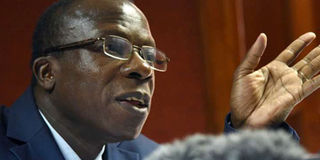Breaking News: At least 10 feared to have drowned in Makueni river
The 2018 Jurist of the Year title goes to Justice Odunga

High Court Justice George Odunga at Milimani Law Courts on March 28, 2018. PHOTO | EVANS HABIL | NATION MEDIA GROUP
What you need to know:
He was described as an independent and open-minded judge who performs his work with diligence hence has contributed largely to the growth of human rights jurisprudence in the country and beyond.
Some of his landmark court decisions include one in which he threw out eight clauses of the controversial security laws which Parliament had passed in a chaotic session in 2015.
He has hit the headlines with his hard hitting decisions. Many have seen him as pro-opposition simply because he has lashed at the government with his court decisions.
While many see him as one who dared to call a spade what it is instead of a big spoon, others have described him as biased and just pro-opposition.
CELEBRATED
This man, Justice George Vincent Odunga, has received a fair share of criticism for his court decisions. But on Friday evening, he defied all manner of criticisms and controversies when he was named and celebrated as the 2018 Jurist of the Year.
EXEMPLARY
According to the Kenyan chapter of the International Commission of Jurists, Justice Odunga has been recognised for exemplary performance in the protection as well as promotion of human rights, democracy and the rule of law in Kenya.
COURAGEOUS
“His calm conduct has proven to be just what the country required at difficult moments, he has earned his place in history as a courageous, firm and wise judge despite the cost of the high stakes political contest in evidence, the public knows his heart and defends his judgment,” said ICJ.
He received his award on a day which is also commemorated as the International Human Rights day.
OUTSTANDING
Born in the 1960s in western part of Kenya, Justice Odunga was described as one who has risen against all odds to attain outstanding academic credentials, an unwavering self-belief and a career in law.
He has an LLB in law from the University of Nairobi and was admitted to the bar as an advocate in 1992 before starting out in private practice at Behan & Okero Advocates.
PERFORMANCE
He has previously been honoured by the Law Society of Kenya for his administration of justice.
He was recently transferred to Machakos as the presiding judge after serving as the head of the judicial review division of the High Court at Milimani Law Courts in Nairobi. He has also worked in the commercial and civil divisions.
EFFICIENT
During his tenure at Milimani, the Judiciary Performance Management and Measurement Evaluation report recognised and commended the judicial review which he led as the best performing court in terms of being the most efficient as well as fast in hearing and determining cases.
Justice Odunga is a member of the High Court Advisory Committee and International Refugee Law Judges Association (Africa Chapter).
OPEN-MINDED
During the ceremony, he was described as an independent and open-minded judge who performs his work with diligence hence has contributed largely to the growth of human rights jurisprudence in the country and beyond.
DEDICATION
“This year, our distinguished Jurist has been recognised locally, regionally and internationally for his lifetime dedication to human rights for which he fought to the very end,” said ICJ.
Some of his landmark court decisions include one in which he threw out eight clauses of the controversial security laws which Parliament had passed in a chaotic session in 2015. The Court of Appeal upheld his High Court decision.
APPOINTMENT
At the verge of the repeat Presidential election last year, Justice Odunga ruled that the appointment of constituency returning officers and their deputies was illegal. The matter moved to the appellate court but has not been finalised.
CONTEMPT
And just before he was transferred, he handled Mr Miguna Miguna’s case regarding his deportation, where the judge ruled that nothing can bar the court from holding a government officer liable of acting in contempt as well as conduct that would occasion oppression of the public.





